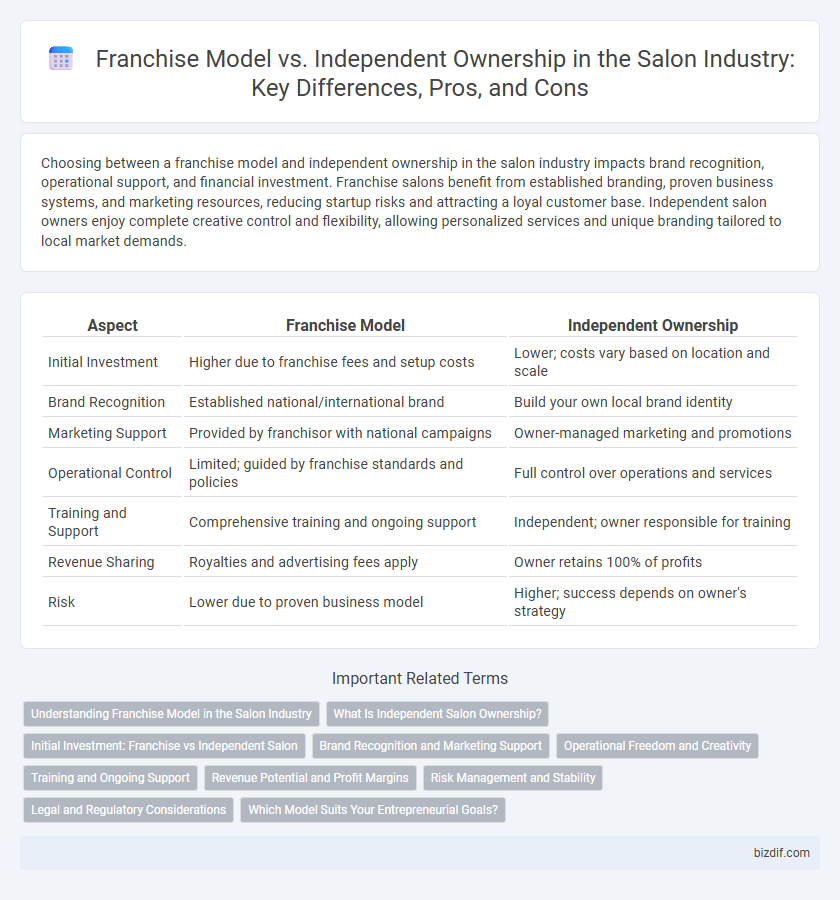Choosing between a franchise model and independent ownership in the salon industry impacts brand recognition, operational support, and financial investment. Franchise salons benefit from established branding, proven business systems, and marketing resources, reducing startup risks and attracting a loyal customer base. Independent salon owners enjoy complete creative control and flexibility, allowing personalized services and unique branding tailored to local market demands.
Table of Comparison
| Aspect | Franchise Model | Independent Ownership |
|---|---|---|
| Initial Investment | Higher due to franchise fees and setup costs | Lower; costs vary based on location and scale |
| Brand Recognition | Established national/international brand | Build your own local brand identity |
| Marketing Support | Provided by franchisor with national campaigns | Owner-managed marketing and promotions |
| Operational Control | Limited; guided by franchise standards and policies | Full control over operations and services |
| Training and Support | Comprehensive training and ongoing support | Independent; owner responsible for training |
| Revenue Sharing | Royalties and advertising fees apply | Owner retains 100% of profits |
| Risk | Lower due to proven business model | Higher; success depends on owner's strategy |
Understanding Franchise Model in the Salon Industry
The franchise model in the salon industry offers entrepreneurs a proven business framework, including established brand recognition, standardized training, and marketing support, which reduces the risks associated with startup phases. Franchisees benefit from access to proprietary products, operational systems, and ongoing corporate assistance that streamline day-to-day management and enhance customer retention. Understanding this model is crucial for salon professionals evaluating scalable growth options versus the autonomy and flexibility found in independent ownership.
What Is Independent Salon Ownership?
Independent salon ownership refers to a business model where the owner has full control over all aspects of the salon, including branding, services, pricing, and hiring decisions, without the restrictions imposed by franchise agreements. This model allows salon owners to customize their customer experience and adapt quickly to local market trends, fostering a unique and personalized brand identity. Independent salons often benefit from higher profit margins since they avoid franchise fees and royalties, though they bear full responsibility for marketing, operations, and compliance.
Initial Investment: Franchise vs Independent Salon
Initial investment in a franchise salon typically ranges from $150,000 to $500,000, covering franchise fees, equipment, and brand licensing, whereas independent salons may require a lower upfront cost of $50,000 to $200,000, primarily for equipment and leasehold improvements. Franchise models offer built-in brand recognition and marketing support, which can reduce customer acquisition costs despite the higher initial outlay. Independent ownership allows greater financial flexibility and control over spending but often demands more effort in building a customer base without the advantage of an established brand.
Brand Recognition and Marketing Support
Franchise salons benefit from established brand recognition that attracts a loyal customer base and streamlines marketing efforts, resulting in consistent revenue streams. Independent salon owners face challenges building brand identity but enjoy creative freedom and can tailor marketing strategies to local demographics. Franchise models provide comprehensive marketing support, including national campaigns and digital platforms, while independents rely heavily on grassroots promotion and personal branding.
Operational Freedom and Creativity
Franchise salon owners benefit from established brand recognition and proven operational systems but face restrictions on creativity due to strict corporate guidelines. Independent salon owners enjoy full operational freedom, allowing them to tailor services, design, and marketing strategies uniquely to their clientele. This autonomy fosters innovation and personalized customer experiences, often leading to stronger local brand loyalty.
Training and Ongoing Support
Franchise salons offer comprehensive training programs and continuous support from established brands, ensuring standardized service quality and updated industry practices. Independent salon owners often customize training to fit their unique style but may face challenges maintaining consistent skill development and operational guidance. Access to franchise resources and marketing expertise provides a competitive advantage in skill enhancement and business growth.
Revenue Potential and Profit Margins
Franchise models in the salon industry often provide higher initial revenue potential due to brand recognition and established customer bases, while independent ownership allows for greater control over profit margins by minimizing royalty fees and operational restrictions. Franchise salons benefit from standardized marketing and supplier agreements, reducing costs and increasing efficiency, yet must share profits to corporate entities. Independent owners can customize services and pricing, potentially maximizing profits but may face slower revenue growth without the support of a well-known brand.
Risk Management and Stability
Franchise models in salons offer structured risk management through proven business systems, brand recognition, and ongoing corporate support, enhancing financial stability and reducing operational uncertainties. Independent ownership provides greater control and flexibility but requires managing all risks independently, including marketing, compliance, and client acquisition, which can lead to higher volatility. Choosing between the two depends on balancing the desire for autonomy with the need for consistent revenue and risk mitigation strategies.
Legal and Regulatory Considerations
Franchise models in the salon industry require strict adherence to franchisor-established legal frameworks, including trademark protection, operational standards, and franchise disclosure documents regulated by the Federal Trade Commission (FTC). Independent salon owners maintain greater regulatory flexibility but must individually comply with local licensing, health, and safety regulations, which vary significantly by state and municipality. Choosing between franchise and independent ownership impacts legal responsibilities, contractual obligations, and the ability to customize business practices within regulatory limits.
Which Model Suits Your Entrepreneurial Goals?
Choosing between a franchise model and independent ownership in the salon industry depends on your entrepreneurial goals, risk tolerance, and desire for autonomy. Franchise models offer structured brand recognition, training, and marketing support, ideal for entrepreneurs seeking proven systems and lower startup risks. Independent ownership provides greater creative freedom and control over salon operations, suited for those prioritizing personalized branding and unique customer experiences.
Franchise Model vs Independent Ownership Infographic

 bizdif.com
bizdif.com